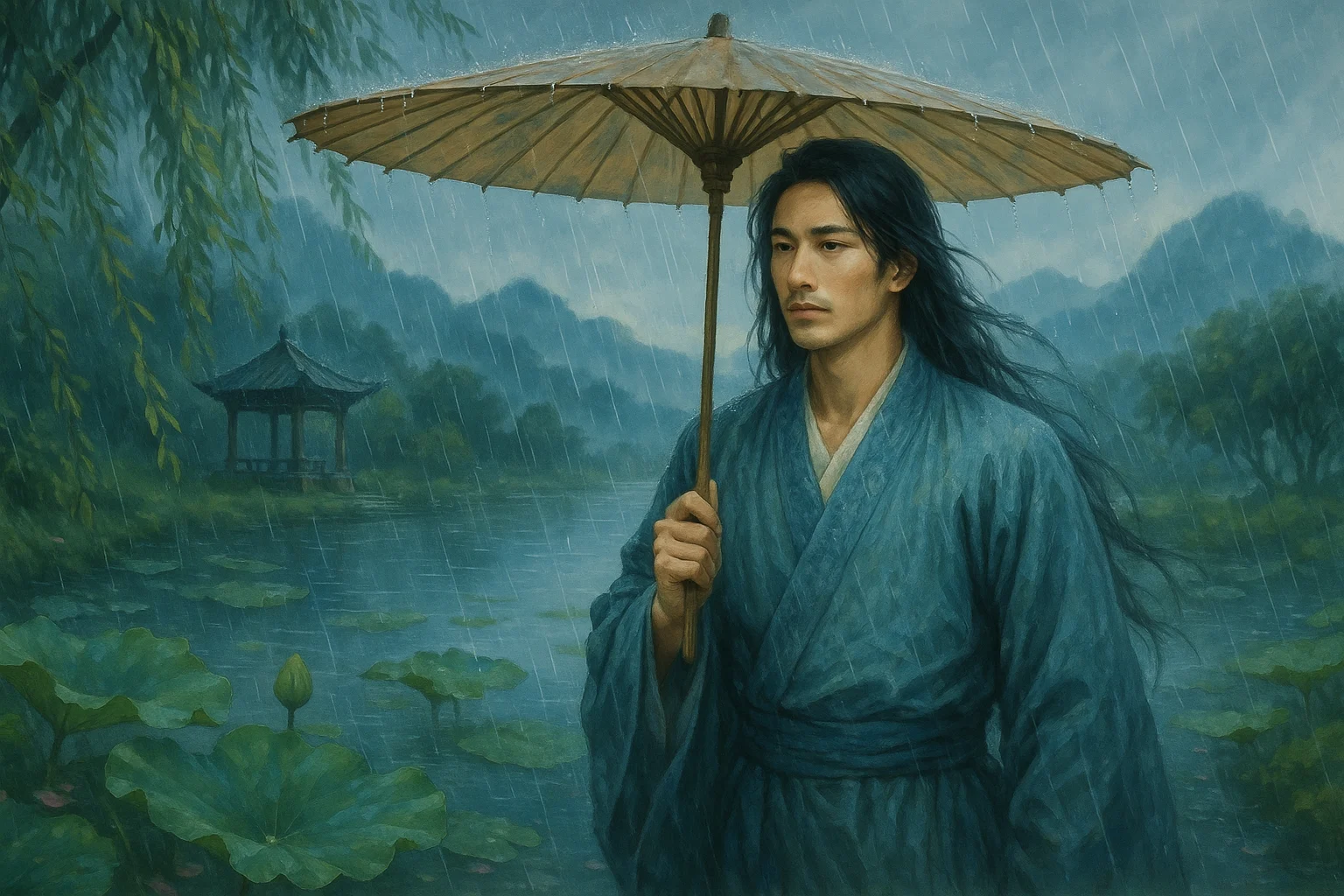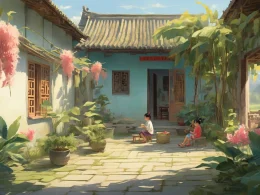I climb the tower to gaze on southern snow,
Your grace shines like the crescent moon aglow.
The moon outshines the snow so bright,
Revealing my host’s heart tonight.
Our lifelong bond, though time may fade,
Stays clear through age and illness weighed.
I raise the cup to cheer your name,
Yet find this wine-cup bears no flame.
Original Poem
「菩萨蛮 · 登楼一望南山雪」
登楼一望南山雪。使君风味如新月。
月向雪前明。主人今夜情。平生相与意。老病犹堪记。
吕本中
对酒为君欢。酒杯嫌未宽。
Interpretation
This Song of Buddhist Dancers was composed during the Southern Song Dynasty. Lü Benzhong was already elderly and plagued by illness at the time, having experienced a tumultuous official career, national calamities, and displacement. This lyric was written while ascending a tower in winter, where the sight of the snow-covered Southern Mountains stirred his emotions. The "Shǐjūn" (Lord) in the lyric likely refers to the poet's friend or superior, carrying connotations of respect. Ascending a tower to gaze at the snow is inherently a leisurely and refined pastime, but under the poet's brush, it becomes not only praise for the winter scenery but also an infusion of years of friendship, the sentiments of life's twilight, and the cherishing and reluctance to part with beautiful times. The entire lyric blends scene and emotion, its tone lucid and beautiful while carrying a warm human touch.
First Stanza: "登楼一望南山雪。使君风味如新月。"
Dēng lóu yī wàng nánshān xuě. Shǐjūn fēngwèi rú xīnyuè.
Ascending the tower, a single gaze towards the Southern Mountains' snow;
The Lord's noble air is like the newborn moon;
The opening pair “登楼一望南山雪” (Dēng lóu yī wàng nánshān xuě) establishes both action (ascending) and vista (snow-covered peaks), framing a scene of wintry purity. “使君风味如新月” (Shǐjūn fēngwèi rú xīnyuè) seamlessly shifts focus to the companion, using “new moon” (“xīnyuè”) as a radiant metaphor for his character—implying luminous clarity, unblemished virtue, and natural elegance resonant with Daoist ideals.
"月向雪前明。主人今夜情。"
Yuè xiàng xuě qián míng. Zhǔrén jīnyè qíng.
The moon shines bright before the snow;
The master's heart this very night;
The interplay of “月” (yuè, moon) and “雪” (xuě, snow) creates a crystalline luminescence (“月向雪前明”) that heightens the scene’s ethereal clarity. “主人今夜情” (Zhǔrén jīnyè qíng) pivots decisively from external beauty to internal warmth—the host’s profound affection forming a poignant counterpoint to the winter chill.
Second Stanza: "平生相与意。老病犹堪记。"
Píngshēng xiāng yǔ yì. Lǎobìng yóu kān jì.
The bond forged through all our years;
Age and ailment cannot erase its trace;
“平生相与意” (Píngshēng xiāng yǔ yì) celebrates a lifetime of shared understanding. “老病犹堪记” (Lǎobìng yóu kān jì) juxtaposes bodily frailty (“老病”) against undiminished loyalty (“犹堪记”), transforming personal struggle into a testament to enduring fellowship.
"对酒为君欢。酒杯嫌未宽。"
Duì jiǔ wèi jūn huān. Jiǔbēi xián wèi kuān.
Raising the cup, to your delight;
This wine-vessel feels too confined!
“对酒为君欢” (Duì jiǔ wèi jūn huān) embodies convivial generosity. The iconic closing line “酒杯嫌未宽” (Jiǔbēi xián wèi kuān)—criticizing the cup’s “narrowness”—is pure lyrical hyperbole: it erupts with uncontainable camaraderie and the bittersweet weight of time’s passage, rendering the physical object transparent to overwhelming emotion.
Holistic Appreciation
The lyric takes the act of winter tower-ascent and snow-gazing as its starting point, moving from the external landscape to the inner world. The first stanza paints a picture of lucent purity through the "Nánshān xuě" (Southern Mountains' snow) and "xīnyuè" (new moon), skillfully using the scenery to reflect the noble character and refined air of the "Shǐjūn" (Lord), thus rendering an implicit tribute. The second stanza converges on emotion, articulating the depth of friendship that persists unchanged despite old age and infirmity, culminating in the shared delight of drinking. This final note expresses fervent sentiment while simultaneously holding the reflective poignancy characteristic of life's later years.
The contrast between the chilling purity of the natural world and the warming depth of human connection creates a delicate, compelling equilibrium throughout the poem—a balance between coolness and warmth. This interplay showcases the distinctive blend of lucid elegance and emotive richness found in Lü Benzhong's mature poetic style.
Artistic Merits
- Interlacing Scene and Emotion, Contrasting Chill and Warmth: Uses the cold imagery of snow and moonlight to set off and enhance the depiction of warm, profound human bonds; the external chill deliberately intensifies the perceived warmth of inner feeling.
- Vivid Metaphor, Portraying Noble Character: The use of the "new moon" ("xīnyuè") to describe the Shǐjūn creates an elegant, evocative image, subtly conveying admiration for his moral stature and intrinsic virtue.
- Concise Language, Profound Sentiment: The lyric employs direct, accessible vocabulary yet carries significant emotional weight and depth of meaning. Within a remarkably concise structure, it encompasses a life reviewed and a friendship celebrated.
- Subtle and Resonant Ending: The closing line "jiǔbēi xián wèi kuān" (The wine cup, blamed for not being wider) functions simultaneously as an emphatic, hyperbolic expression of friendship's abundance and leaves the reader with a palpable sense of unexpressed depth and lingering emotion, inviting contemplation.
Insights
This lyric teaches us that within life's twilight or amidst hardship, sincere friendship and mutual understanding remain a vital solace for the spirit. No matter the external chill, the inner warmth born of cherishing these connections can imbue existence with profound meaning. The poem's fusion of natural beauty with the landscape of human feeling offers a gentle reminder: in our daily lives, we should consciously seek out and treasure the bonds between people. It urges us to cherish the moments of shared joy available to us now, nurturing relationships that aspire to the enduring purity symbolized by the "new moon shining upon fresh snow" ("xīnyuè yìng xuě").
About the Poet

Lü Benzhong (吕本中 1084 - 1145), a native of Shouxian in Anhui, was a renowned poet and Neo-Confucian scholar of the Southern Song Dynasty. As a key theorist of the Jiangxi Poetry School, he proposed the concept of "living method" (huofa), advocating for natural variation within established poetic rules. With over 1,270 surviving poems, his Genealogy of the Jiangxi Poetry School (Jiangxi Shishe Zongpai Tu) established Huang Tingjian as the school's patriarch, profoundly influencing Song poetic theory and serving as a bridge between the Jiangxi School and the Four Masters of the Mid-Song Revival.












